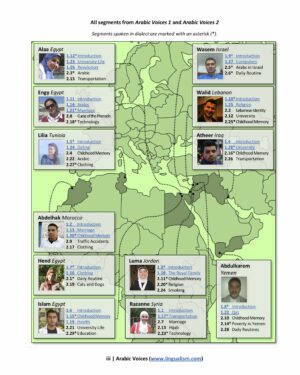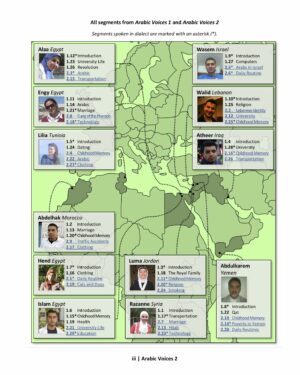Home » Modern Standard Arabic » Clothing in Morocco–Abdelhak
Clothing in Morocco–Abdelhak
| Peace, mercy and blessings of God, [00:00.2] | السلام عليكم ورحمة الله وبركاته، | |
| Hello and welcome to a new video of Arabic Voices on your way to learning Arabic. [00:03.0] | أهلًا ومرحبًا بكم في فيديو جديد من فيديوهات Arabic Voices طريقك لتعلم العربية. | |
| Today we will talk about what Abdelhak said about the nature of life in Morocco, and the clothes that people wear in their daily lives in Morocco. [00:10.5] | اليوم سنتحدّث عمّا قاله عبد الحق بشأن طبيعة الحياة في المغرب، والملابس التي يرتديها الناس في حياتهم اليومية في المغرب. | |
| We start with line 1, where Abdelhak says, "The styles of clothing in Morocco vary according to age groups." [00:26.0] | ونبدأ في السطر الأول حيث يقول عبد الحق: (تختلف أنماط الألبسة في المغرب حسب الفئات العمرية). | |
| We'd like to review here quickly on what we've already explained, we can use حسب or طبقًا لـ (according to) to indicate that one thing changes based on another. [00:38.0] | ونودّ المراجعة هنا سريعًا على ما كنا قد شرحناه من قبل، يمكننا أن نستخدم [حسب] أو [طبقًا لـ] للإشارة إلى أن أمرًا ما يتغير بناءً على أمرٍ آخر. | |
| Styles of clothing in Morocco vary according to age groups" or "according to age groups." That is, the styles of clothing depend on the age group, and it varies according to… or varies based on the age group. [00:51.1] | (تختلف أنماط الـ... الألبسة في المغرب حسب الفئات العمرية) أو (طبقًا للفئات العمرية) أي أن أنماط الألبسة تعتمد على الفئة العمرية، ويختلف بناءً… أو تختلف بناءً على الفئة العمرية. | |
| حسب or طبقًا لـ two different ways of referring to the same thing, and we'd like to review here quickly on this point. [01:07.5] | [حسب] أو [طبقًا لـ] طريقتين مختلفتين للإشارة إلى نفس الشيء، ووددنا المراجعة هنا سريعًا على هذه النقطة. | |
| On line 2, Abdelhak says, "In major cities such as Casablanca, where it is noticed... the openness of young people to the West, and their influence on their clothing." [01:19.6] | في السطر الثاني—يقول عبد الحق: (ففي المدن الكبرى كمدينة الدار البيضاء حيث يُلاحظ… يُلاحظ انفتاح الشباب على الغرب، وتَأثُرِهم بلباسهم). | |
| Abdelhak uses here the masdar (nominal) from the verb تَأثَر, which is تَأثُرِهم, and when using the verb تَأثَر (influenced) or the masdar, the preposition بـ must be added to it. [01:34.7] | ويستخدم عبد الحق هنا المصدر من الفعل [تَأثَر] وهو [تَأثُرِهم]، وعند استخدام الفعل [يتأثر] أو تأث… أو [تَأثَر] أو المصدر [تَأثُرِهم]، لابدّ وإلحاقه… لا بدّ من إلحاقه بحرف [ الباء]. | |
| You say, "someone has been affected by something." You use the preposition بـ with this verb. [01:51.4] | تقول أن: (أحدًا ما قد تأثر بشيءٍ ما)، فتستخدم حرف [ الباء] مع هذا الفعل. | |
| You say, for example, "I have been affected by experiences...by experiences," or that so-and-so was affected by the actions of others, and so on. You use the preposition بـ with the verb يتأثر, the verb تَأثَر or the masdar تَأثُر. [01:59.5] | تقول مثلًا: (أنا قد تأثرت بخبرات… بخبراتِ كثيرًا)، أو (أن فلان قد تأثر بأفعال غيره)، وهكذا، فتستخدم حرف [ الباء] مع الفعل [يتأثر] أو الفعل [تَأثَر] أو المصدر [تَأثُر]. | |
| Great! Where Abdelhak says on line 3, "Where jeans dominate the taste of the public, whether the rich or the poor." [02:18.1] | عظيم! حيث يقول عبد الحق في السطر الثالث: (حيث جينز يطغى على ذوق العامة سواءً الأغنياء أو الفقراء). | |
| Abdelhak here uses the word سواء (whether) to equalize between two different categories, you can use the word سواء with the word أو (or) to equate two people, or two different categories, or two different things. [02:30.6] | ويستخدم عبد الحق هنا كلمة [سواء] للتسوية بين فئتين مختلفتين، يمكنك استخدام كلمة [سواء] مع كلمة [أو] للمساواة بين شخصين، أو فئتين مختلفتين، أو أمرين مختلفين. | |
| You can say, for example, "This matter will affect all people, whether rich or poor, that most people will refrain from this matter, whether big or small," and so, you equate between two groups or equal between two things; سواء... أو... (whether... or...) [02:49.7] | يمكنك أن تقول مثلًا: (إن هذا الأمر سيؤثر على كل الناس سواء الغني أو الفقير، إن معظم الناس سيتورعون من هذا الأمر سواء الكبير أو الصغير)، وهكذا، فأنت تساوي بين فئتين أو تساوي بين أمرين؛ [سواء... أو...]. | |
| Great! We then move to line 11, where Abdelhak says, "In general, the dress in Morocco is very distinctive," and the word عمومًا that is, بصفة عامة (in general). [03:14.5] | عظيم! ننتقل بعد ذلك إلى السطر الحادي عشر، حيث يقول عبد الحق: (وعمومًا فاللباس في المغرب مميز جدًا)، وكلمة [عمومًا] أي [بصفة عامة]. | |
| You can use وعمومًا or بصفة عامة or وعامةً as well, to refer to a command...to a general matter, you say, "And generally this command is useful, in general, this is useful, or in general this is useful." Any of these expressions have the same meaning. [03:29.4] | يمكنك أن تستخدم [وعمومًا] أو [بصفة عامة] أو كلمة [وعامةً] كذلك، للإشارة إلى أمر… إلى أمرٍ عام، تقول: (وعمومًا فإن هذا الأمر مفيد، وعامةً فإن هذا الأمر مفيد، أو وبصفة عامة إن هذا الأمر مفيد)؛ [عمومًا، بصفة عامة، أو عامةً]، أيٍ من هذه العبارات يكون بمعنى واحد. | |
| On line 17, Abdelhak says, "The youth are used to wearing clothes that belong to Western culture." [03:59.2] | في السطر السابع عشر—يقول عبد الحق: (فأقبل الشباب على ارتداء الألبسة التي تنتمي إلى الثقافة الغربية). | |
| Abdelhak here uses the verb أقبل (I accept), and when using the verb this verb, you can or … or must use the preposition على (on) with it, so you say "I accept such and such a matter." I accept ON something," and this means the desire for something in particular. [04:09.5] | ويستخدم عبد الحق هنا الفعل [أقبل]، وعند استخدام الفعلُ الفعل [أقبل] يمكنك أو… أو لابدّ أن تستخدم حرف [ على] معه، فتقول (أقبل فلان على أمرٍ ما)، (أقبل على أمرٍ ما)، وهذا يعني الرغبة في شيء معين. | |
| For example, you can say, "Many people have accepted the purchase of the new device," so it was accepted if they want to… or they accepted it, which they wanted to buy, and actually bought it. "He accepts something," wants to do something; "I accept ON." [04:32.1] | فيمكنك أن تقول مثلًا: (أقبل الكثير من الناس على شراء الجهاز الجديد)، فأقبل عليه أي رغبوا في… أو أقبلوا عليه أي رغبوا في شرائه، واشتروه بالفعل؛ [يقبل على شيء] يرغب في فعل أمرٍ ما؛ [أقبل على]. | |
| Great! We then move to line 12, where Abdelhak says, "The way and style of dress has changed in Morocco... among Moroccans) Sorry... Abdelhak says here "has changed." We had previously explained how to use قد, and that when you enter the past tense, it means emphasis. That is, it further emphasizes the matter. [04:52.8] | عظيم! ننتقل بعد ذلك إلى السطر العشرين، حيث يقول عبد الحق: (لقد تغيرت طريقة ونمط اللباس لدى المغرب… المغاربة) عفوًا… ويقول عبد الحق هنا [لقد تغيرت]، كنا قد شرحنا من قبل كيف كيفية استخدام [قد]، وأنها عندما تدخل على [الفعل الماضي] فهذا يعني [التحقيق]، أي أن هذا يزيد تأكيدًا الأمر. | |
| I have gone out of my house," that is, I have already gone out. "I have done it," that is, I have already done it, and this is to be sure. [05:27.1] | (قد خرجت من بيتي)، أي أنني بالفعل قد خرجت؛ (قد فعلت الأمر)، أي أنني بالفعل قد فعلته، وهذا للتأكيد. | |
| Here we see that Abdelhak not only used the word قد, but he also preceded it with the particle لـ, so he said لقد. [05:35.4] | وهنا نرى أن عبد الحق لم يستخدم فقط كلمة [قد]، ولكنه قد سبق [قد] كذلك بحرف [ اللام]، فقال [لقد]. | |
| And when you use لقد, it is an affirmation over an affirmation, that is, you are assertive. You say, "I did it," which shows assertiveness. I'm pretty sure I did. I've done it. That means there's no doubt about it. [05:44.6] | وعندما تستخدم [لقد] فهذا تأكيدٌ فوق تأكيد، أي أنك جازم؛ تقول (لقد فعلته)، وهذا يعني الجزم (أنا متأكد جدًا أنني فعلته). (لقد قمت بالأمر) وهذا يعني أنه لا شك في هذا الأمر. | |
| Here Abdelhak asserts and says, "the way and style of dress has changed among Moroccans," meaning there is no doubt that the way… the way and style of dress has changed in Morocco. [06:03.1] | فهنا يجزم عبد الحق ويقول (لقد تغيرت طريقة ونمط اللباس لدى المغاربة)، أي لا شك أن الطريقة… طريقة ونمط اللباس قد تغير في المغرب. | |
| On line 23, Abdelhak says, "Likewise, women wear less indecent clothes than before," and he uses the phrase من السابق (than before) here to refer to every time that has passed, so you can use من السابق, or من ذي قبل. [06:19.3] | في السطر الثالث والعشرون—يقول عبد الحق: (وكذلك النساء أصبحن يرتدين ثيابًا أقل حشمة من السابق)، ويستخدم عبارة [من السابق] هنا للإشارة إلى كل زمنٍ قد مضى، فيمكنك أن تستخدم [من السابق]، أو [من ذي قبل]. | |
| The two different phrases have one meaning. You can say, "Likewise, women wear less indecent clothes than before," [than before] or [from before] with a single sense. [06:40.7] | [من السابق] أو [من ذي قبل] عبارتين مختلفتين بمعنى واحد. يمكنك أن تقول: (كذلك النساء أصبحن يرتدين ثيابًا أقل حشمة من ذي قبل)، [من ذي قبل] أو [من السابق] بمعنى واحد. | |
| You can say, "The situation has become better than before" or "better than before." Both of them have the same meaning. [06:46.2] | يمكنك أن تقول: (الوضع أصبح أفضل من السابق) أو (أفضل من ذى قبل) كلاهما بمعنّا واحد. | |
| With this, we have finished our comment on this part of the book. [07:05.3] | وبهذا نكون قد انتهينا من تعليقنا على هذا الجزء من الكتاب. | |
| I hope you have benefited from this video. [07:10.8] | أتمنى أن تكونوا قد استفدتم من هذا الفيديو. | |
| Thank you very much. [07:13.3] | أشكركم شكرًا جزيلًا. | |
| Peace, mercy and blessings of God. [07:14.9] | السلام عليكم ورحمة الله وبركاته. |
Video Lessons
Arabic Voices MSA Lessons
Arabic teacher Mostafa Ahmed takes us through segments in MSA from Lingualism's book Arabic Voices 1: Authentic Listening and Reading Practice in Modern Standard Arabic and Colloquial Dialects, explaining interesting points of grammar and vocabulary.
© 2024 Lingualism LLC










